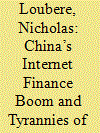| Srl | Item |
| 1 |
ID:
158293


|
|
|
|
|
| Summary/Abstract |
One of the main drivers of China’s e-commerce boom is the dramatic expansion of the country’s Internet finance industry, which has grown and diversified at a staggering rate over the past decade. The emergence of Chinese Internet finance has been discussed in largely positive terms as facilitating commercial activity. It has also been linked to the wider developmental goal of promoting financial inclusion through the provision of financial services to previously excluded populations. Emerging from the global microfinance movement, the concept of financial inclusion depicts increased access to financial services (particularly credit) as an inherently beneficial means of empowering the poor and driving bottom-up economic development. This article challenges this dominant narrative of beneficial digital financial inclusion in China. It draws on the growing body of literature critiquing the global financial inclusion movement, and examines examples of exploitation, fraud, instability, and extraction related to expanded digital financial coverage in contemporary China. It then demonstrates that digital financial inclusion is part and parcel of the Chinese government’s plans to create a social credit system in an attempt to construct a “trustworthy society.” In this way, digital financial inclusion can be seen as a key element in a wider project of expanding surveillance through big data in order to close down spaces for those seeking to contest the hegemonic socioeconomic order. The article argues that these examples illuminate fundamental processes implicit in the expansion of the commercial Internet finance industry. In this way, while the extension of digital financial inclusion in China benefits certain groups, it also necessarily serves to reproduce patterns of inequality and exploitation.
|
|
|
|
|
|
|
|
|
|
|
|
|
|
|
|
| 2 |
ID:
193761


|
|
|
|
|
| Summary/Abstract |
This study investigates the impact of digital financial inclusion (DFI) on the subjective well-being of China's older population, specifically examining the effects on depression, life satisfaction, and self-reported health status. Drawing on data from the China Health and Retirement Longitudinal Study (CHARLS), our research reveals that the advancement of DFI has a significant positive impact on reducing symptoms of depression and improving the self-reported health status of elderly individuals. Furthermore, our analysis of heterogeneity indicates that these welfare improvements are more pronounced in rural areas compared to urban areas and among the non-multidimensional poverty (non-MP) group rather than the multidimensional poverty (MP) group. Moreover, we find that the impact of DFI on depression is more immediate, while its influence on self-rated health takes longer to manifest. These findings collectively suggest that enhancing digital finance can effectively improve subjective well-being, particularly among vulnerable groups such as the elderly population, individuals facing multidimensional poverty, and those residing in rural areas. The immediate relief of depression and the gradual improvement in self-reported health highlight the policy implications of leveraging digital finance to enhance subjective well-being.
|
|
|
|
|
|
|
|
|
|
|
|
|
|
|
|